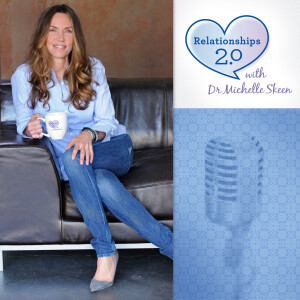
Relationships 2.0 With Dr. Michelle Skeen
Science:Social Sciences

Guest: Dr. Victoria Dunckley author of Reset Your Child’s Brain: A Four-Week Plan to End Meltdowns, Raise Grades, and Boost Social Skills by Reversing the Effects of Electronic Screen-Time.
 2015-09-09
2015-09-09
Download
Right click and do "save link as"
About the book:
A no-cost, nonpharmaceutical treatment plan for children with behavioral and mental health challenges.
Increasing numbers of parents grapple with children who are acting out without obvious reason. Revved up and irritable, many of these children are diagnosed with ADHD, bipolar illness, autism, or other disorders but don’t respond well to treatment. They are then medicated, often with poor results and unwanted side effects. Based on emerging scientific research and extensive clinical experience, integrative child psychiatrist Dr. Victoria Dunckley has pioneered a four-week program to treat the frequent underlying cause, Electronic Screen Syndrome (ESS).
Dr. Dunckley has found that everyday use of interactive screen devices — such as computers, video games, smartphones, and tablets — can easily overstimulate a child’s nervous system, triggering a variety of stubborn symptoms. In contrast, she’s discovered that a strict electronic fast single-handedly improves mood, focus, sleep, and behavior, regardless of the child’s diagnosis.
Offered now in this book, this simple intervention can produce a life-changing shift in brain function — all without cost or medication. Dr. Dunckley provides hope for parents who feel that their child has been misdiagnosed or inappropriately medicated, by presenting an alternative explanation for their child’s difficulties and a concrete plan for treating them.
About the author:
Victoria L. Dunckley, M.D., author of “Reset Your Child’s Brain,” is an award-winning integrative child psychiatrist who specializes in children with complex or treatment-resistant mental health conditions. By combining conventional and complementary methods with lifestyle interventions, she aims to optimize treatment while minimizing the need for psychotropic medication. She consults regularly with schools, multi-disciplinary treatment teams, and the courts, and is a sought-after expert regarding the physiological impact of screen-time on the developing nervous system.
A regular speaker for parents’ groups and health clinicians, she is also a frequent media contributor for outlets such as the Today show, NBC National News, and the Investigation Discovery channel. Clinically, she divides her practice between the private and public sectors in Los Angeles.
After studying biology at the University of California San Diego, Dr. Dunckley pursued her medical training at Albany Medical College in New York, then returned to the west coast for her psychiatric residency and child & adolescent psychiatry fellowship at U.C. Irvine’s Neuropsychiatric Center. She’s since worked in a variety of community mental health settings including residential treatment centers, clinics catering to adoptive, foster, and transitional age youths, and Regional Centers serving clients with neurodevelopmental disabilities. In her private practice she has extensive experience treating tics & Tourette Syndrome, ADHD, bipolar disorder, attachment disorder, and PTSD (post-traumatic stress disorder). Whether in the private or public setting, she’s known for going the extra mile to help each patient achieve his or her maximum potential.
Out of an overwhelming need, Dr. Dunckley developed the Save Your Child’s Brain program in 2010 to offer the general public the pioneering program she was using with her patients to address overstimulation from screen-time, a phenomenon she coined “Electronic Screen Syndrome.” Now called the Reset Program, she has utilized this program to help more than 500 children, teens, and young adults who weren’t responding to conventional treatment alone.
In recent years Dr. Dunckley began studying the interface between integrative medicine and psychiatry more formally, and in 2012 became board-certified by the American Board of Integrative Holistic Medicine. She has been a diplomate of the American Board of Psychiatry and Neurology and the American Academy of Child and Adolescent Psychiatry for more than thirteen years. The winner of numerous awards from Vitals.com, she was also named one of America’s Top Psychiatrists by the Consumer’s Research Council of America.
view more
More Episodes
012345678910111213141516171819
Create your
podcast in
minutes
- Full-featured podcast site
- Unlimited storage and bandwidth
- Comprehensive podcast stats
- Distribute to Apple Podcasts, Spotify, and more
- Make money with your podcast
It is Free
- Privacy Policy
- Cookie Policy
- Terms of Use
- Consent Preferences
- Copyright © 2015-2024 Podbean.com





